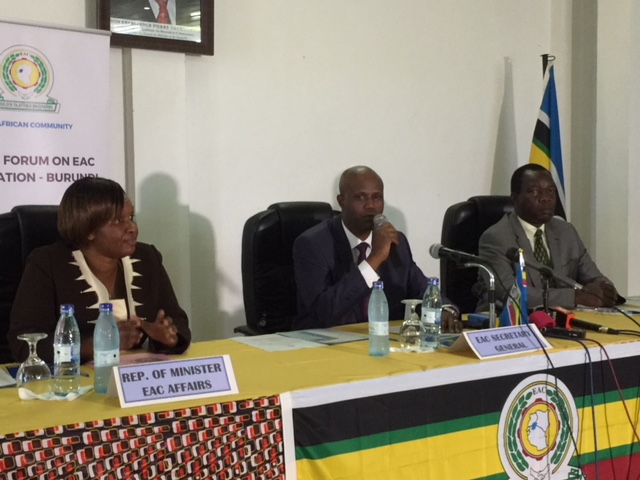
Burundian Minister for EAC Affairs emphasises the need to make EAC integration process inclusive
East African Community Secretariat, Arusha, Tanzania, 15th June, 2018:The Minister to the Office of the President responsible for East African Community Affairs in Burundi, Hon. Isabelle Ndahayo, has emphasized the need to involve all stakeholders including the ordinary people in the EAC integration process.
Hon. Ndahayo said that it was by making the integration process inclusive that stakeholders and citizens who are also the taxpayers would own the process and support it.
The Minister noted that the Treaty for the Establishment of the EAC was clear that the integration process should be people-driven with the private sector as the engine of economic growth.
Hon. Ndahayo said that inclusivity involved engaging stakeholders as much as possible in the formulation and implementation of policies on integration.
The Minister restated the commitment of the Government of Burundi to involve the private sector, civil society organisations and other interest groups in the integration process by establishing a National Dialogue Committee in accordance with the directive of the EAC Council of Ministers.
The Minister particularly singled out the role of the media whom she said were at the frontline in educating EAC citizens on the integration.
Hon. Ndahayo said that with the East African integration progressing at a steady pace, the role of the media would become critical in promoting socio-economic transformation in the region in addition to eliciting the full participation of the citizenry in the process.
The Minister made the remarks in a speech read on her behalf by her assistant, Ms. Clarette Inamahoro, at the opening session of the inaugural EAC Secretary General’s Media Forum held in Bujumbura. The forum drew participation from journalists in Burundi and other EAC Partner States as well representatives of civil society, the private sector and government of Burundi.
Hon. Ndahayo said that journalists should be able to act as catalysts in bridging the information and awareness gap between the EAC and the citizens while leveraging in addition to educating them on the status and achievements of the integration.
Addressing the forum, EAC Secretary General Amb. Liberat Mfumukeko said that one of the critical challenges facing the Community was lack of awareness on the integration process.
Amb. Mfumukeko said that the EAC had made significant achievements including increased trade volumes, infrastructure development, water supply and sanitation, and harmonization of education systems and curricula yet most East Africans could not link these achievements to the Community.
In his remarks, the Registrar of the East African Court of Justice, His Worship Yufnalis Okubo, said the Court had played a crucial role in dispensing justice to aggrieved East Africans with regard to matters touching on the violation of the provisions of the EAC Treaty.
Mr. Okubo noted that most of the cases that had been handled by the Court revolved around the violation of Article 6(d) of the Treaty which demands of Partner States to adhere to the universally acceptable principles of good governance, the rule of law, observance of human rights and social justice.
The Registar cited the case of the Republic of South Sudan whose election of MPs to the East African Legislative Assembly was nullified by the Court after a citizen successfully sued the government for breach of the election rules as specified by the Treaty. The South Sudan National Legislative Assembly subsequently conducted an election of the country’s nine EALA MPs in accordance with the provisions of the Treaty.
On his part, the Deputy Executive Secretary of the East African Science and Technology Commission, Dr. Saidi Kibeya, said that the region would not achieve the goals it had set for itself in increasing trade and socio-economic growth if it didn’t promote Science, Technology and Innovations.
Dr. Kibeya said that it was incumbent upon governments, academic and research institutions to work with the private sector to transform innovations into products and services that could be competitive on the international market.
-ENDS-
For more information, please contact:
Mr Owora Richard Othieno
Head, Corporate Communications and Public Affairs Department
EAC Secretariat
Arusha, Tanzania
Tel: +255 784 835021
Email: OOthieno [at] eachq.org
About the East African Community Secretariat:
The East African Community (EAC) is a regional intergovernmental organisation of five Partner States, comprising Burundi, Kenya, Rwanda, Tanzania and Uganda, with its headquarters in Arusha, Tanzania.
The EAC Secretariat is ISO 9001:2008 Certified
